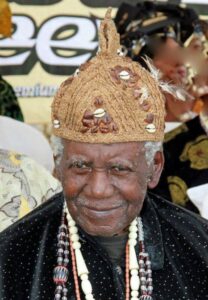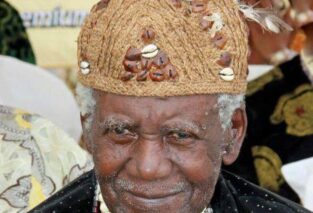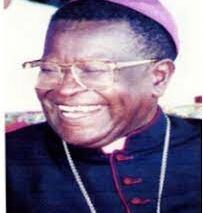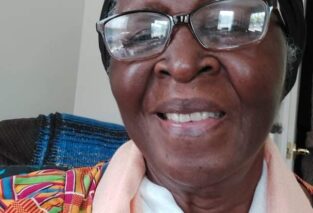
I notice as I grow older that the fingers of my mind frequently reach into the hidden recesses of my memory from where they pull out, and intermittently flash before my eyes, the names and faces of people I might have met, sometimes just once in my life. Then, no matter how hard I try to ignore them, they cling, like a leech, onto the edges of my thoughts and peace only returns to my mind when I release them on paper.
That has been the case of Chief SML Endeley, the late Paramount Chief of the Bakweri people of Buea in Cameroon. Even though Chief SML Endeley and I never ever met face-to-face, images of him have been actively punching the edges of my mind, demanding attention with irritating insistence. It is not the memory of him as the Paramount Chief that invades my sleep so often, no; it is rather the thought of a one-time encounter I had with him – and from a distance — when he was still a young active Chief Justice of the Court of West Cameroon. I believe that was the title he bore at the time.
Let’s spin the hand of time back to 1971. I was then a student at the legendary Cameroon College of Arts, Science and Technology, (CCAST), in Bambili. CCAST Bambili, as it was fondly called, was then the place to be! What with all those gentlemen, who often dressed in suits, walking with silent dignity around campus, looking more like darkly-suited bankers than students! What with all those, for the most part, elegantly-dressed, high-heel shod ladies who, long after walking past you, left floating behind them the sweet fragrance of perfume that would obstinately cling onto your nostrils, leaving you sniffing the air and wishing you could hang around them much longer! What with all those lovers who, as evening sent its fingers down to take possession of the land, would be seen leisurely strolling around arm-in-arm under the whistling pine trees, or clinging to each other as they stood glued onto trees like mating ants, whispering words of love into the air, and giggling as fingers explored the sensitive parts of the body! CCAST was then really the place to be both as an actor or as a spectator that some of us were! The goings-on were certainly fun to watch and to giggle over.
The act of being seen strolling along with a girl, or standing with her under a tree was called “going to Tahiti.” Don’t ask me the origin of that expression. One generation seemed to have inherited it from the generation before and no one cared to know who its author was. Some of us, without lovers of our own, and who were even scared stiff to talk to a girl in case she said ‘yes’ and then you would not know what next to say to her, preferred the safety of the sideline as we watched the ever-exciting game of parading lovers. That was the CCAST we then knew. That was the CCAST of rival student clubs, with the “Top Executives” leading the pack, openly displaying signs of arrogant opulence, with girls of stunning beauty seemingly eating out of their hands. The members of the other clubs – The Social Club, The Pacific Club and The Cultural Club – stepped out of the way, or simply hid in corners, once the “Top Exco” boys were on parade. Saying that CCAST was fun is definitely an understatement.
That was the CCAST some of us glided into. The then long-serving Principal, Mr. SN Dioh, had just ceded his seat to a much younger, bespectacled, always-elegantly-dressed younger man, Mr. Omer Weyi Yembe (OWY). I believe both men are now of late. May their souls find rest in one of the numerous rooms in the Lord’s House!
When OWY strolled around campus, you saw, but more importantly, you felt the aura dripping from the weight of his authority, which he wielded sometimes with ruthless efficacy. I know what I am talking about because I once poked a finger into the side of his administrative authority and left limping from the experience. For one strange reason, I decided that I would smoke my first cigarette in life. After all, was I not already a student in CCAST Bambili, an indication that I was already a man? I then asked a notorious smoker, a classmate of mine, to let me take a puff on his cigarette. We were standing behind a tree and none of us saw OWY coming. No sooner had I stuck that distasteful product in my mouth than OWY suddenly emerged right in front of us. He ordered me to follow him to his office immediately and when I did, he sent me packing home for a week. A very unpleasant experience it was, and still is, for I still shudder when I think of it nearly half a century later.
Back to my encounter with Chief SML Endeley. One brilliant idea OWY had, and for which he deserved much applause, was to invite people from various walks of life to talk to us about life outside the confines of the school premises. He wanted us to hear from some individuals, considered successful in their careers, what they owed their success to and what advice they could give us, especially as many of us were just a few yards from the door of the university. There were even some students, mainly Grades III, II and I teachers, who had already been working before coming to CCAST. We often referred to them, with some disdain, as “Ballads”. I left Bambili without ever getting a satisfactory answer from anyone as to how that word made its way into the CCAST terminology.
OWY first invited a Divisional Officer (DO), who reportedly was the first of his kind anywhere in the Cameroonian administration to have earned a university degree – or so he claimed. The hall was packed full when OWY ushered the gentleman in. He then introduced our guest and urged us to listen attentively for the man was endowed with a wealth of experience that could be of much benefit to us. OWY was effusive in his praise of the man. To our greatest astonishment, however, no sooner had our guest taken his seat than he lashed out at CCAST students for not being patriotic enough. He said that at our last march past ceremony in Mankon during a national event, he had observed that CCAST students, in particular, marched sluggishly and with open arrogance. The fact that we were in CCAST, he continued, did not exempt us from obeying the laws of the Republic. We were showing a bad example to the younger ones.
We were all stunned for that was not what we were expecting to hear; even OWY himself looked visibly uneasy, and I could see contempt on the faces of just about every student. The most irritating part came when students were given the floor to ask questions. The gentleman made fun of students’ questions, claiming we all spoke Pidgin, not English. He would then rephrase the question in what he claimed was good English before giving an answer. At one moment, he sat facing one of the windows, refusing to look at us in the hall. Some of us could take it no more and, as we streamed out, he sat up in surprise, turned to OWY and loudly complained that students could dare walk out on a government official of high standing. Did we not know he could have all of us thrown in jail? I did not wait to hear the rest of his ramblings.
A few months went by and we were again told that another speaker was on his way to talk to us. With the thought of the arrogant Divisional Officer still quite fresh in mind, it was not surprising that some students boycotted the new speaker. But, I was glad I went.
Unlike the earlier speaker, there came a real gentleman, dressed in a dark suit, who stood up and bowed to us when OWY introduced him as Chief Justice SML Endeley of the High Court of West Cameroon. He acknowledged OWY’s introduction with a gentle smile and then stood up and remained standing as he addressed us. What a sharp contrast to our Divisional Officer! You could have heard a pin drop in that hall. Everyone seemed glued to every word that dropped from his lips. Word quickly made the round of the classrooms, where some students were reading, that a real gentleman was in our midst. Before long, the hall was packed full and an angry OWY had to interrupt the session for a short time to enable late-comers take their seat. When his presentation was over, he received a well-nourished round of applause. Then came the question-and-answer session. Whenever a student asked a question, our guest would stand up to answer, only sitting down when he was satisfied his answer had been understood. At no time did he make fun of students’ questions, even those that appeared to some of us as bordering on the ridiculous.
Weeks later, everyone still talked fondly of him, comparing him to the Divisional Officer to whom we all gave a fail grade. For the first time, I began to nurse the desire to study law. I then recalled a conversation I once had years earlier with Mr. Luke Sendze, now a well-known Bamenda-based lawyer, who was still then a student of law in Lagos, Nigeria. He had come to visit my uncle in whose house I was spending my holidays in Victoria. I remember him asking me what I wanted to do when I grew up. I gave him a laundry list of the usual careers Form Three students dream of: a medical doctor, a pilot, an engineer but the word ‘lawyer’ did not find a spot on my list of possible future careers. I remember him asking me if I had ever thought of studying law. I told him that thought had never crossed my mind but that I could give it a thought with time. It took my encounter with Chief Justice SML Endeley some years later to bring that option forcefully to the fore.
I never did study law, though, but even to this day, whenever I think of a man of law for whom I have respect, Chief SML Endeley always pops up to the top of the list. My meeting with him in CCAST was the only time our paths ever crossed, and it was not even a face-to-face encounter. Yet, I remember it so vividly.
Later, I learnt that he had retired and had become the Paramount Chief of the Bakweri people. I was always profoundly irritated whenever I read something bad written about him in the press, especially the accusations of subservience to the Biya regime. I felt that he, and many of our traditional rulers, are mere victims of the highhandedness of a regime that takes an obscene pleasure in reducing our once respected and respectful traditional rulers to mere paupers. The only means many of them have had to survive is, unfortunately, to kowtow to a regime that has never had any respect for traditional authority as we once knew it. However, whatever was said or written about him did not, in anyway, diminish the respect I had for him as a legal luminary. May Chief SML Endeley rest in peace.




